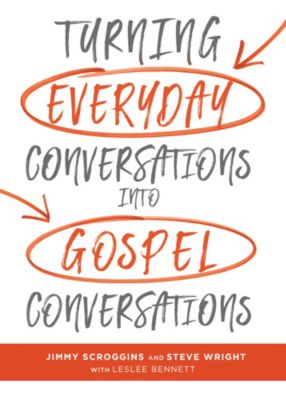
By Marissa Postell
People can fear many different things—snakes, bugs, heights, flying, small spaces, public speaking. But what if you bringing up your faith isn’t on the list of things your friends fear? Would you have spiritual conversations more often?
A recent study from Evangelism Explosion conducted by Lifeway Research found many people are intrigued by the religious devotion of others. Half of Americans (51%) say they’re curious as to why some people are so devoted to their faith. Even among those who are religiously unaffiliated, the majority (60%) are curious about others’ faith. This is especially true among younger adults, as those 18 to 34 (61%) and 35 to 49 (55%) are more likely than those 50 to 64 (43%) and those 65 and older (40%) to say they’re curious about others’ religious devotion.
Half of Americans (51%) say they’re curious as to why some people are so devoted to their faith, including 60% of the religiously unaffiliated, according to an @EEvangelism and Lifeway Research study. Click To TweetThis curiosity is reflected in that most people are open to having conversations about faith—especially if it’s a conversation with a friend. Two in 3 Americans (66%) say they’re at least open to having spiritual conversations with a friend, and 41% of those are very open to these conversations.
In case you’re tempted to say people are open to broadly spiritual conversations but not conversations specifically about Christianity, the study found the numbers are essentially the same when it comes to the Christian faith. Two-thirds of Americans (66%) are at least open to specifically discussing the Christian faith with a friend. And 65% are at least open to talking with a friend about having a relationship with God.
6 in 10 Americans say many of their friends who claim to be Christians rarely talk about their faith, according to an @EEvangelism and Lifeway Research study. Click To TweetYet 6 in 10 Americans (60%) say many of their friends who claim to be Christians rarely talk about their faith. People aren’t scared of talking about faith, but many Christians fear sharing their faith. Here are three things to keep in mind as we grow as disciple makers.
1. Take responsibility
More likely than not, fear of you bringing up your faith isn’t on the list of things your friends fear—even your religiously unaffiliated friends. For some Christians, knowing our friends are open to hearing about our faith is exciting and freeing. But for others, it brings a sense of responsibility that scares us. After all, if our friends are open to having faith conversations, shouldn’t we be faithful to engage them in these conversations?
How many people in your congregation remember the last time they had a faith conversation with someone outside the church? Click To TweetHow many people in your congregation remember the last time they had a faith conversation with someone outside the church? And how many of these have been avoiding faith conversations because they assume people don’t want to hear about their faith? For how many of them has this simply become an excuse to remain in comfortable places doing comfortable things?
Many in the church aren’t sharing their faith with others, and it may not be because their friends don’t want to talk about faith. It may be because they don’t want to talk about faith. We must not allow our assumptions about our friends to keep us from sharing our faith. It doesn’t have to be complicated. Our friends may very well already be open to the conversation.
2. Build friendships
Encourage believers to start by building friendships. Although half of Americans (51%) say they’re at least open to faith discussions with a stranger, even more (66%) are open to having spiritual conversations with friends. The foundation of friendship is most important for the religiously unaffiliated, as 38% say they’re not at all open to having a conversation about faith with a stranger. But within friendships, only 20% of the religiously unaffiliated say they aren’t at all open to having a faith conversation.
The best way the people in your church can love their friends is by sharing the hope of Christ with them. — @marissapostell Click To TweetPre-established friendships aren’t always necessary for faith conversations, but for many, the relationship of trust helps people be more open to these conversations. Unbelieving friends are our mission field. They need the truth of the gospel, and their friends in your church may be the ones they’re willing to listen to. The best way the people in your church can love their friends is by sharing the hope of Christ with them.
3. Live faithfully
Our church members need to know viewing their friends as a mission field doesn’t mean every conversation they have needs to be a gospel presentation, but the entirety of their lives should be a gospel presentation.
Much like it often takes time to build a friendship with another person, it most often takes time for people to build a relationship with God. Our willingness to talk about our faith is just a part of another person’s journey toward knowing and loving God. When we look, we realize there are plenty of opportunities around us every day to talk about our faith. Why? Because our faith impacts how we see the world and everything we do.
Our goal is not to see another person confess faith in Christ every time we have a conversation. Instead, our goal is to live lives that allow us to faithfully point people toward Christ. — @marissapostell Click To TweetWhy do we have hope despite the obvious brokenness of the world? We know the victory over sin has already been won. Why do we work diligently even when we’re working from home and no one is watching? Our work is an act of worship to a holy God. Why do we respond with patience when our kids spill or break another item in our houses? God’s grace is sufficient for us.
Our goal is not to see another person confess faith in Christ every time we have a conversation. Instead, our goal is to live lives that allow us to faithfully point people toward Christ. We may never see the fruit that comes from continually pointing our friends toward Jesus one small conversation or interaction at a time. But if we are found faithful, that is enough. We plant. We water. But we trust God to give the growth (1 Corinthians 3:5-9). Our faith is intriguing to many of the people around us. Let’s take that as an invitation to clearly speak life to a dying world.









